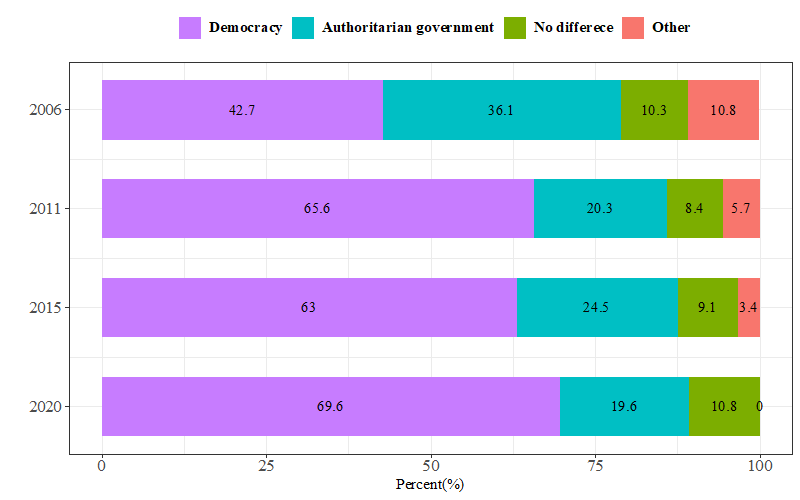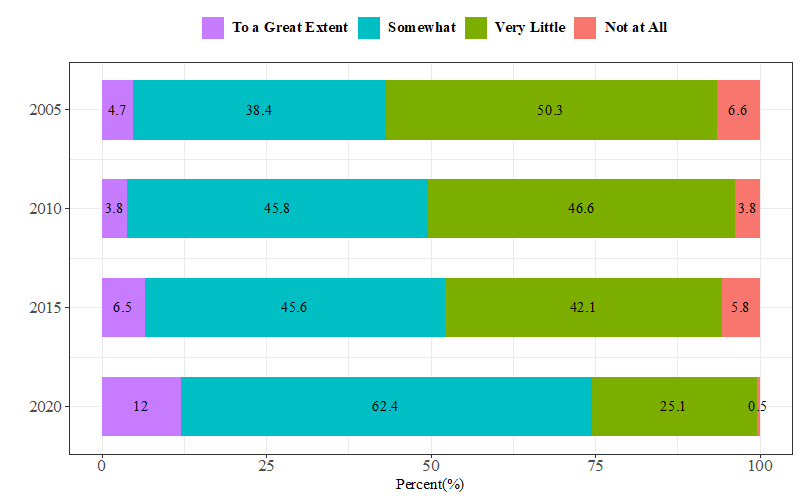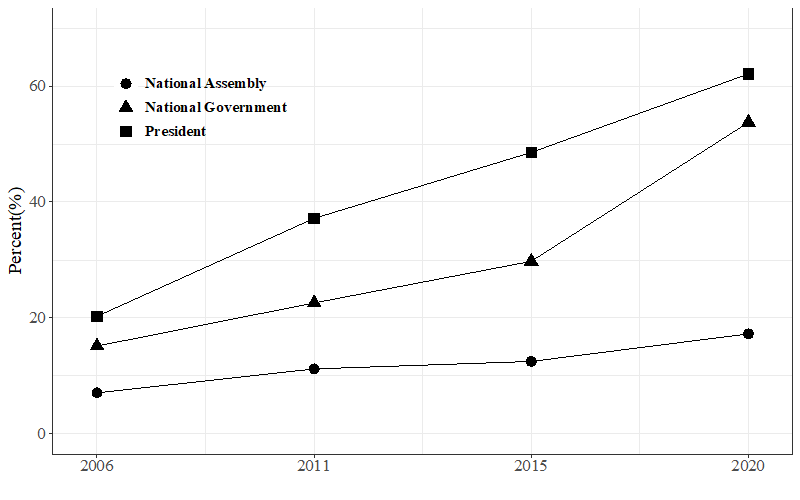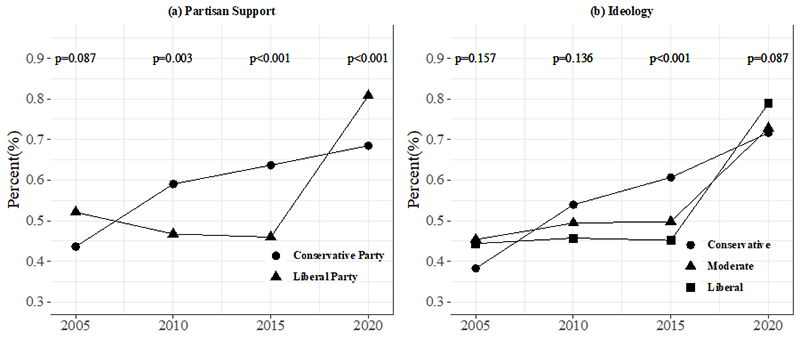[Asia Democracy Issue Briefing] Attitudes toward Democracy in South Korea
Commentary·Issue Briefing | 2020-09-16
Woo Chang Kang
Editor's Note
South Koreans’ attitudes toward democracy have changed over time. In this issue briefing, Prof. Woo Chang Kang examines the public’s changing attitudes towards democracy since the mid-2000s by analyzing the public support for democracy based on three aspects: democratic principles, performance and institutions. Based upon the survey data, Prof. Kang states that compared with the relatively low level of support for democracy in the early 2000s, support for democracy has been constantly increasing in all aspects since then, marking the highest in the 2020 survey. Prof. Kang argues that while the increasing support indicates the maturity of democracy in the country, it is to be seen whether the public would continue the high level of support for democracy when the COVID-19 pandemic is over, as the survey was conducted during the period when the pandemic was effectively under control.
Public support is crucial for the vitality and stability of democracy. A low level of public support weakens the legitimacy of a regime in a normative sense and hinders the effective operation of governance in practice. Public support is even more important in new democracies, in which democratic norms and principles have not been firmly established in society and legacies from previous authoritarian regimes sustain. There are increasing concerns about waning public support for democracy in both developed and newly democratized countries. South Korea is not an exception. Based on the analysis of the survey data from 1996 to 2006, for instance, Park (2011) concluded that “the public evaluation of democracy in practice has been largely negative, while the public acceptance of democracy as an idea has been mixed”. In this paper, we examine how public attitudes toward democracy in South Korea have changed since the mid-2000s.
Examining Support for Democracy
Following Park (2011), we disaggregate support for democracy into three aspects: principles, performance and institutions. Support for democratic principles reflects whether the public prefer democracy as the preferred form of government to alternatives. We measure it using the question which asks respondents to select one of the following three statements: ‘Democracy is always preferable to any other kind of government’, ‘Under some circumstances, an authoritarian government can be preferable to a democratic one’, and ‘For people like me, it does not matter whether we have a democratic or a non-democratic regime.’ Figure 1 shows that support for democracy as the preferred form of government significantly increased between 2005 and 2020. Those who answer that democracy is always preferable increased from 43% in 2006 to 66% in 2011, 63% in 2015 and 70% in 2020. Those who answer that an authoritarian government can be preferable under some circumstances decreased from 36% in 2006, to 20% in 2011, 25% in 2015 and 20% in 2020.

To examine the public evaluation of democratic performance, we rely on the question that asks how many respondents are proud of maturity of South Korean democracy. In Figure 2, we can also see that satisfaction with democratic performance also significantly increased during the same period. Those who choose positive responses combining ‘to a great extent’ and ‘somewhat’ increased from 43% in 2005 to 50% in 2010, 52% in 2015 and 74% in 2020. In contrast, negative responses combining ‘very little’ and ‘not at all’ declined from 57% in 2005 to 50% in 2010, 48% in 2015 and 26% in 2020.

As a measure of public support for democratic institutions, we examine public confidence in three key political institutions: president, national government and the National Assembly. Figure 3 depicts the proportion of survey respondents who answer that they have trust in each institution. In general, the public demonstrate the greatest level of confidence in president followed by the national government. The level of confidence in the National Assembly remains the lowest. In 2006, public confidence in all three institutions remained low. Only about 20% of respondents said that they have trust in president and about 15% said that they have trust in the national government. Only about 7% replied that they have trust in the National Assembly. Since then, however, public confidence in president has rapidly increased to 39% in 2011, 49% in 2015 and 62% in 2020. Similarly, public confidence in the national government has increased to 22% in 2011, 30% in 2015 and 54% in 2020. In contrast, public confidence in the National Assembly has been stagnating. It increased to 10% in 2011, 13% in 2015 and 18 % in 2020.
Overall, South Korean attitudes toward democracy have become more positive in all three aspects of regime evaluation. One possible explanation for such a high level of support in 2020 would be successful responses to the COVID-19 outbreak by the South Korean government. We can see that public satisfaction increased to a greater extent in the evaluation of regime performance between 2015 and 2020, which is similar to patterns for public confidence in the national government that is in charge of addressing the COVID-19. Yet, the earlier trend indicates that this is not the whole story. In terms of support for democratic principles, for example, it was between 2006 and 2010 when support for democracy increased the most. The change between 2015 and 2020 is somewhat qualified. Similarly, we can see that confidence in president has been increasing since 2011. In other words, all three indicators suggest that public support for democracy has started recovering since the mid-2000s.

Determinants of Democratic Support
To better understand the determinants of democratic support in South Korea, a number of analysis have been conducted and presented here. First, there is some evidence that public attitudes toward democracy have been politicized during this period. In particular, Figure 4 depicts how support for democratic performance varies by respondents’ partisan support and ideology. In panel (a), 52% of liberal party supporters and 44% of conservative party supporters provided positive evaluation about the maturity of democracy in 2005. Since then, the gap between different partisan supporters has widened over time. The positive evaluation increased among the conservative party supporters up to 59% in 2010 and 64% in 2015, reflecting that the conservative party was in power. During the same period, the positive evaluation among the liberal party supporters decreased to 47% in 2010 and 46% in 2015. In 2020 when the liberal party was in power, the positive evaluation among the liberal party supporters ascended up to 81%. Interestingly, the level of support among the conservative voters did not decrease but increase by 5%, possibly reflecting that even the conservative party supporters acknowledge that the government addresses the COVID-19 pandemic effectively. In panel (b), we observe the similar pattern. In 2005, the evaluation of democratic maturity was not distinct among voters with different ideological characteristics but has become more salient over time. Voters who share the ideological characteristics with the governing party tend to evaluate democracy more favorably than others.

Secondly, consistent with the findings of the previous literature on democratic support, different factors affect different dimensions of democratic support. Economic performance of the government and electoral outcomes primarily affect support for democratic performance. Those who evaluate the state of the economy positively also evaluate the maturity of democracy favorably. Also, voters who reside in the governing party’s stronghold provide the positive evaluation of democracy, while those in the opposition party’s stronghold are less satisfied with democratic performance. However, the evaluation of the national economy does not affect support for democratic principles. On the other hand, citizenship and the perception of political polarization affect support for democratic principles, but do not affect support for democratic performance. Citizenship taps whether the public embrace a shared set of norms which are expected from a good citizen. Our analysis shows that those who approve citizenship norms are more likely to provide greater support to democratic principles. In contrast, those who perceive that political polarization among major parties is serious tend to be more skeptical about democracy in principle.
Implications for South Korean Democracy
In the 2020 Korean Identity Survey, about 70% of the respondents prefer democracy to the authoritarian government, 74% approve the maturity of Korean democracy, and 62% answer that they have confidence in president. It is noteworthy that support for democratic performance improves even among conservative party supporters, in contrast with the general perception that the electoral defeat degrades support for democratic performance among supporters of the opposition party. Compared with the low to moderate support for democracy reported in the early 2000s, the high level of support for democracy in all aspects of consideration is an indication that democracy in South Korea is in a better shape as the only game in town. Yet, we need to keep in mind that the survey was implemented during the period when the COVID-19 was effectively contained. In this respect, it is questionable whether the public would continue to provide the high level of support for democracy, particularly in terms of the evaluation of regime performance when the pandemic is over and politics return to normal.
■ This brief is an abridged version of the paper, “Identity and Support for Democracy in South Korea”, presented at the Conference on the 2020 Korean Identity Survey held on July 6, 2020 at the Korean National Assembly Hall.
■ Woo Chang Kang is an Assistant Professor in the Department of Political Science and International Relations at Korea University. His research interests are in political behavior and quantitative political analysis, with particular attention to Korea and the United States. He received his Ph.D. in politics at New York University, and previously taught at the Australian National University.
■ Typeset by Eunji Lee, Research Associate/Project Manager
For inquiries: 02 2277 1683 (ext. 207) | ejlee@eai.or.kr
The East Asia Institute takes no institutional position on policy issues and has no affiliation with the Korean government. All statements of fact and expressions of opinion contained in its publications are the sole responsibility of the author or authors.
Center for Democracy Cooperation
Democracy Cooperation
![[ADRN Issue Briefing] Decoding India’s 2024 National Elections](/data/bbs/eng_issuebriefing/20240419123938102197065(1).jpg)
Commentary·Issue Briefing
[ADRN Issue Briefing] Decoding India’s 2024 National Elections
Niranjan Sahoo | 2020-09-16
![[ADRN Issue Briefing] Inside the Summit for Democracy: What’s Next?](/data/bbs/eng_issuebriefing/2024032815145548472837(1).jpg)
Commentary·Issue Briefing
[ADRN Issue Briefing] Inside the Summit for Democracy: What’s Next?
Ken Godfrey | 2020-09-16